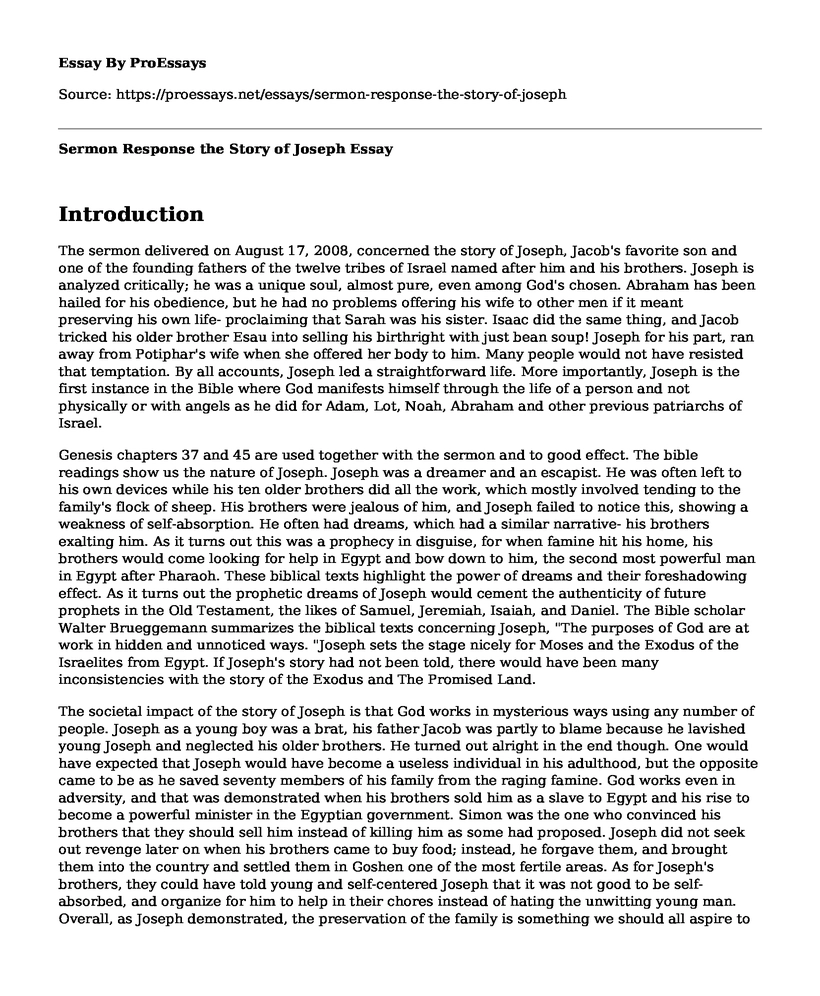Introduction
The sermon delivered on August 17, 2008, concerned the story of Joseph, Jacob's favorite son and one of the founding fathers of the twelve tribes of Israel named after him and his brothers. Joseph is analyzed critically; he was a unique soul, almost pure, even among God's chosen. Abraham has been hailed for his obedience, but he had no problems offering his wife to other men if it meant preserving his own life- proclaiming that Sarah was his sister. Isaac did the same thing, and Jacob tricked his older brother Esau into selling his birthright with just bean soup! Joseph for his part, ran away from Potiphar's wife when she offered her body to him. Many people would not have resisted that temptation. By all accounts, Joseph led a straightforward life. More importantly, Joseph is the first instance in the Bible where God manifests himself through the life of a person and not physically or with angels as he did for Adam, Lot, Noah, Abraham and other previous patriarchs of Israel.
Genesis chapters 37 and 45 are used together with the sermon and to good effect. The bible readings show us the nature of Joseph. Joseph was a dreamer and an escapist. He was often left to his own devices while his ten older brothers did all the work, which mostly involved tending to the family's flock of sheep. His brothers were jealous of him, and Joseph failed to notice this, showing a weakness of self-absorption. He often had dreams, which had a similar narrative- his brothers exalting him. As it turns out this was a prophecy in disguise, for when famine hit his home, his brothers would come looking for help in Egypt and bow down to him, the second most powerful man in Egypt after Pharaoh. These biblical texts highlight the power of dreams and their foreshadowing effect. As it turns out the prophetic dreams of Joseph would cement the authenticity of future prophets in the Old Testament, the likes of Samuel, Jeremiah, Isaiah, and Daniel. The Bible scholar Walter Brueggemann summarizes the biblical texts concerning Joseph, "The purposes of God are at work in hidden and unnoticed ways. "Joseph sets the stage nicely for Moses and the Exodus of the Israelites from Egypt. If Joseph's story had not been told, there would have been many inconsistencies with the story of the Exodus and The Promised Land.
The societal impact of the story of Joseph is that God works in mysterious ways using any number of people. Joseph as a young boy was a brat, his father Jacob was partly to blame because he lavished young Joseph and neglected his older brothers. He turned out alright in the end though. One would have expected that Joseph would have become a useless individual in his adulthood, but the opposite came to be as he saved seventy members of his family from the raging famine. God works even in adversity, and that was demonstrated when his brothers sold him as a slave to Egypt and his rise to become a powerful minister in the Egyptian government. Simon was the one who convinced his brothers that they should sell him instead of killing him as some had proposed. Joseph did not seek out revenge later on when his brothers came to buy food; instead, he forgave them, and brought them into the country and settled them in Goshen one of the most fertile areas. As for Joseph's brothers, they could have told young and self-centered Joseph that it was not good to be self-absorbed, and organize for him to help in their chores instead of hating the unwitting young man. Overall, as Joseph demonstrated, the preservation of the family is something we should all aspire to do as long as we breathe.
Cite this page
Sermon Response the Story of Joseph. (2022, Jun 30). Retrieved from https://proessays.net/essays/sermon-response-the-story-of-joseph
If you are the original author of this essay and no longer wish to have it published on the ProEssays website, please click below to request its removal:
- Essay Sample on Cancer and the Family
- Christianity Role in Independence of Slaves Essay Example
- Essay Example on Virtual Museum: Enhancing Museum Experiences Through Digital Interaction
- A Critical Assessment of Etienne Gilson's "God and Philosophy"
- Essay Example on Superheroes: Increasing Diversity in the Modern World
- Paper Sample on Lost World: The Native Americans' Reverence for Earth and Life
- Reasons Behind Movement in the US - Essay Example







